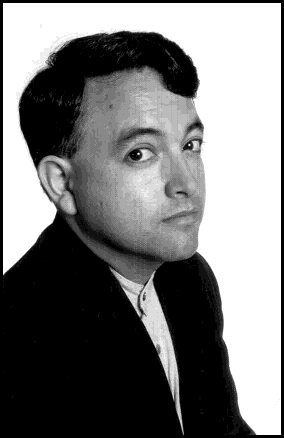A Memoir of Our Immigrant Lives
Guillermo Reyes
(Wisconsin)

The first few chapters of the book are certainly winning. Willy sasses everyone: his mother, his aunts, even his psychotherapist. This latter tells him to stop answering her questions with questions: "Just answer." Then she says, rather wisely, "You see yourself as a guest in other people's family because you don't have to belong, you don't want the responsibility of having an actual family. Perhaps you don't want a family."
Guillermo is William in English. Once he and his mother make it to the United States, María starts calling him "Willy." He doesn't like it. He's right. After making through Madre & I, I think he might be better off as "Wooly." Or "Wily." Or, best, "Wary."
He does seem quite wary of his accomplishments. While María is busy trying to get him to get a job, get him married, with babies, to become a doctor, or a lawyer ... well, he's in university. He spends his days as a professional student at the University of California, that famous site of wool-gatherers. When they refuse to let him hang around the Los Angeles campus any more, he moves to San Diego where he gets in a program in playwriting, once again joining the thousands of us who managed to stay on campus for the better part of our lives, leaving --- if at all --- with sincere regret.
Willy ultimately wangles a post in Arizona, tells us that he is a professor of theater at the university there. It's another sun-strewn palace of extended childhood for us baby boomers, a place where we can drink green tea and nibble on croissants and pursue, from time to time, a higher academic degree.
There's one thing wrong here, though: Willy may lollygag about on some of the most soporific campuses in the world, but he sure as hell doesn't hang out in the sun or at the university pool or anywhere near the beach. Since he lives in places like LA, San Diego, and Tempe, Arizona --- everyone begs him to go swimming. But, halfway through this chronicle, he reveals that he has something called BDD. He'll invent any excuse in the book --- and many are laid out in this book --- why he can't go out to swim or water-ski or lie in the sun near the fresh or salt waters.
Katharine A. Phillips called it "Body Dysmorphic Disorder:" Those with BBD "perceive in themselves bodily flaws unseen by others." They "build their entire reality around avoiding the discovery or exposure of such flaws, to the point that some people literally seclude themselves from society altogether."
Looking at Guillermo's pictures in Madre, one doesn't get any sense of him looking to be a Chilean King Kong. In fact, he appears to be not unhandsome ... a somewhat wistful youngster. But he believes himself to be so weird looking that if he so much as wears a T-shirt or short pants, when people get a gander at his hairy physique, they'll scream or run from the room (or the beach or the pool).
It is a wonder that Willy ever finds life at all ... but he does, finally, thankfully, in Milan, Italy. There he pairs up with a pair, Francisco and Stefano, and suddenly wolf-man forgets about his bushy tail and gets love nonstop.
Here we have a classic tale of a family stuck in a system of entwinement --- one, in this case, that guts mother and son alike. María strikes one as being great company: she never stops going, takes advantage of where ever she is (Santiago, Los Angeles, Portland) to discover the culture of the world around them. The dialogue between the mother and son is lively and diverting. But underneath all this by-play is a mutual dependence that manifests itself in María's need to watch over him constantly. She even sneaks out of her house-keeping job to fly to Italy to visit him in Milan during his studies and passionate love affairs there.
At one point late in Madre and I, Willy goes off to a gay bar in Tijuana. A young man comes over to say, "My friend wants to meet you." Willy looks and sees "a short young man, dark, surprisingly handsome with a vivid smile." He immediately starts thinking, "Why would he want to meet me? I'm not convinced this is on the up and up. Who is this older man? A pimp, trying to sell me one of his boys? How long will it be before he asks for money?"
Madre is thus a tale of immigrant's success, but also a tale of continuing self-defeat. Willy, in the long run, proves to be more than an immigrant: he is also an alien from his own body. At the end, María develops cancer, yet manages to survive in a hospice for months until they finally kicked her out. Getting kicked out of a hospice, because she refuses to die! No wonder she had such a hold on us ... and on him. Our guess is that she refuses to die because she didn't want to leave her son behind unmarried, complete with a real job, real children. Instead of calling this Madre and I perhaps ¡Mama Mia! would have been more to the point.